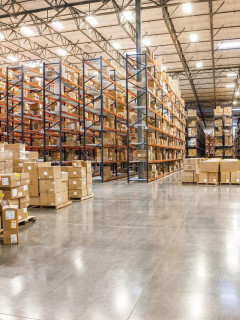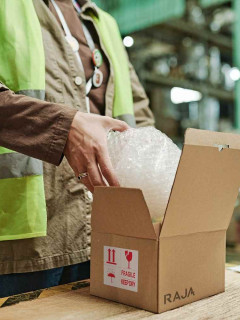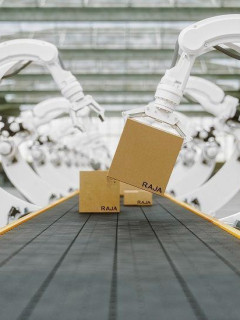Stocks, deliveries, operator management, order picking… During the lockdown, e-commerce warehouses had to reorganise much of their organisation.
 To review the situation, and to draw good practices for the times to come, we interviewed Steven Dogoda.
To review the situation, and to draw good practices for the times to come, we interviewed Steven Dogoda.

He is the logistics and transport manager of Noza Distribution, leader in the BtoB and BtoC e-commerce sector for smoking articles (rolling papers, lighters, chichas, etc.) and vaping articles (electronic cigarettes, vaporisers, etc.), handling 85,000 parcels each year.
How did you decide to react to the announcement of the containment?
Our first reflex was to inform ourselves as best we could, by disentangling the true from the false. In this complex period, we were hearing a lot of rumours, in particular rumours of announced shortages, or of new organisations to be set up.
Finding the official and true information was a necessity, to quickly reassure and secure our 25 employees. But Noza Distribution being an SME, we are lucky to have an almost family atmosphere, where our employees trust each other.
Have you had to deal with stock concerns?
This crisis affected us during the beginning of the lockdown, as we were looking to reduce stock levels for the annual stocktaking at the end of March, so we had to completely reorganise our supplies, reordering to avoid possible stock-outs.
Fortunately, as we have a BtoB activity, we benefit from a sufficient level of stock. Thus, as some types of shops had to close (sales shops, growshops…), we were able to “recover” their stocks to face the increase in BtoC orders, without being confronted with restocking problems. We were thus able to guarantee a product availability rate of over 90% on our 9000 references.
You also had to adapt your logistical organisation, how did this work out?
We quickly did our best to provide our employees with as much information and resources as possible, so that they could come to work in peace, despite a difficult and heavy context.
Thus, we took care to set up a new logistical organisation in the warehouse:
- At each shift start, operators were (and still are) asked to clean their hands with a hydroalcoholic solution, to put on a mask and, if they wish, to take their temperature with a non-contact forehead thermometer.
- We have also posted the instructions relayed by the government at the entry points and in the rest room, so that they remain in everyone’s mind at all times.
- To avoid contact between operators in the warehouse as much as possible, we also set up a half-group system: the team was divided into two, with one part working in the morning and the other in the afternoon.
- Because working with a mask can be uncomfortable, especially during activities that require a lot of physical effort, we have also set up break times for the operators, who can go outside to get some fresh air without a mask.
- Finally, when they leave their workstations, the pickers clean their workstations, i.e. the tables, touch screens, handles of the order preparation areas and computers, using disinfectant wipes and sprays provided.
We have also ensured that access to the warehouse by external service providers is restricted, with all those delivering goods, or picking up parcels and pallets for customers, still having to remain in the designated airlock to this day.

Noza Distribution’s logistics warehouse in Dainville
Did you have any problems with the supply of materials for your business during the period?
At the beginning, yes. An acquaintance of ours was kind enough to produce fabric masks for us, until we could get access to “official” barrier masks. Every day, we discovered new needs, and we adapted as we went along.
The customer service was able to meet our expectations, and the delivery times, in a complex context like this one, were optimal: the announced delivery times were 5 days, and we were sometimes delivered in 24 to 48 hours.
Moreover, faced with the crisis, and not knowing how the supply chain would be impacted, we also overstocked packaging material: cartons, tape, stretch film, etc. RAJA adapted to our expectations in this respect too, and ensured the availability of its products, thanks in particular to its majority supply in Europe.
How did you deal with the situation on the transport side?
In normal times, all our transport management systems are automated, but during the lockdown, every day a carrier announced a new measure: such and such a department was saturated, such and such an area was no longer served, products were no longer delivered by counter-signature, or new size constraints were declared…
Here again, adaptation was key. On the one hand, we limited the size of certain parcels, thanks to postal packaging, so that they could be sent directly to the letterbox. On the other hand, we readapted our transport rules: certain carriers were no longer offered to certain customers, because they would no longer take on parcels exceeding a specific size or value, for example.
How did you communicate with your customers?
We communicated with them a lot, and quite quickly.
On both our websites(Noza Distribution for BtoB, and S-Factory for BtoC), we integrated reassuring messages in the sliders, indicating that we were continuing to deliver, applying anti-contagion practices.
The S-Factory e-commerce site slider
In the order tunnel, we also took care to inform customers about the delivery conditions during the crisis. As traditional delivery times were extended, we indicated an approximate delivery time to reassure them.
But above all, we communicated on social networks. Our operators played the game very quickly, agreeing to be featured in posts and stories on Instagram, Facebook and Twitter. We showed, through authentic content, that our operators were doing everything possible to respect the safety and hygiene instructions in the warehouse, to serve them as well as possible. In addition to reassuring our customers, this initiative strengthened the team spirit in the warehouse.
What are the challenges ahead for you and the e-commerce world in general?
At Noza Distribution, the lockdown has paradoxically been a positive period from a sales point of view. At the very beginning of the crisis, we certainly experienced a drop in volume, linked to the general anxiety of the French. But very quickly, orders exploded.
Products for smokers are not in themselves essential products… except from the point of view of the smokers themselves, who were reluctant to buy outside, in a tobacconist’s shop where they would be exposed to the virus. This period therefore enabled many customers to discover us, and more generally to discover the benefits of e-commerce. I think thatwe are therefore experiencing a new impetus for e-commerce.
In this sense, our big challenge is to continue to offer customers more and more quality services, beyond our products: shorter response times, faster processing of orders, choice of carrier and their prices..
For the time being, we are waiting to observe customer behaviour in the coming weeks, as well as the government’s new responses to the crisis. Our efforts to protect employees and customers do not stop: teleworking is still the norm, whenever possible, and our logistics team continues to avoid contamination risks as much as possible.
All in all, on a daily basis, we follow Charles Darwin’s quote that “it is not the strongest who win, but those who adapt most quickly to change”.
Thanks again to Steven for sharing his experience, and his vision of the future of e-commerce!














